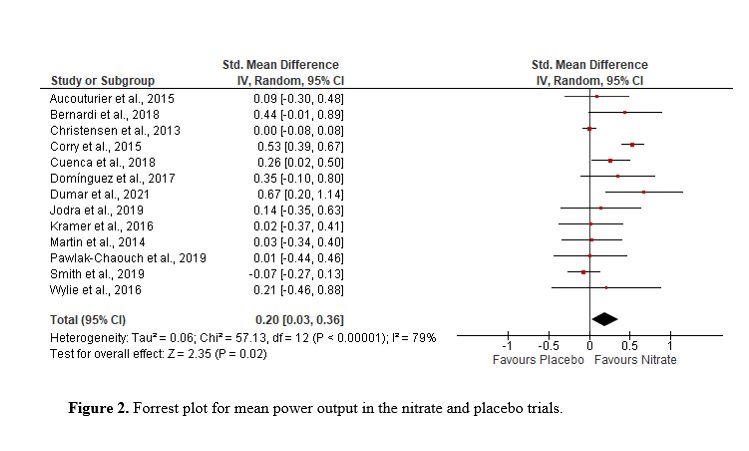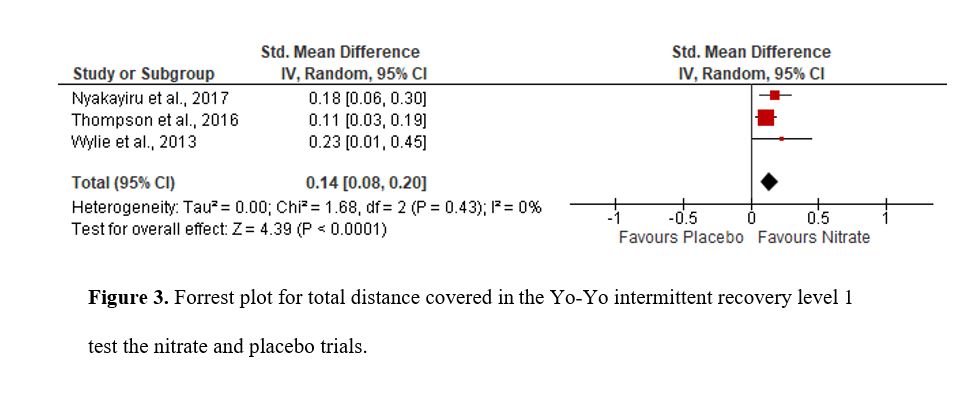Background Inorganic nitrate (NO3-), which can be reduced to nitrite (NO2-) and subsequently nitric oxide (NO), has emerged as a potential ergogenic aid in a variety of exercise settings. While recent systematic reviews and meta-analyses suggest some small positive effects of NO3- supplementation on performance, the effect of NO3- supplementation on performance during single and repeated bouts of short-duration, high-intensity exercise is unclear.
Objective To conduct a systematic review and meta-analysis to evaluate the effects of NO3- supplementation on performance during single and repeated bouts of short-duration, high-intensity exercise in healthy humans. A secondary purpose was to evaluate whether performance outcomes were influenced by the NO3- supplementation regime (dose and duration of supplementation) and high-intensity exercise protocol (number and duration of exercise bouts) performed.
Methods This review was conducted following the Preferred Reporting Items for Systematic reviews and Meta-analyses (PRISMA) guidelines. MEDLINE and SPORTDiscus were strategically searched for relevant articles, which were screened based on pre-determined inclusion/exclusion criteria, and critically evaluated using the Revised Cochrane Collaboration Risk of Bias tool 2 for crossover trials. Paired analysis for cross-over trials was used to perform a random effects meta-analysis for each performance outcome and generate standardized mean differences (SMD) between the NO3- and placebo supplementation conditions. Heterogeneity between studies was assessed using the Chi2 and I2 statistics.
Results Of 1147 records identified, 26 studies were eligible for the systematic review with 22 eligible for meta-analysis. Five studies had a low risk of bias, 18 studies had some concerns, and three studies had a high risk of bias. Compared to placebo, time to reach peak power was lower during all-out sprint exercise after NO3- supplementation (SMD=0.75, P=0.02) (Figure 1). In addition, NO3- supplementation had a small positive effect on mean power output (MP) (SMD=0.20, P=0.02) (Figure 2). Sub-group analyses revealed that MP was greater after NO3- supplementation when NO3- dose was ≥ 8 mmol (SMD=0.27, P=0.04) but not 15 s – ≤ 30 (SMD=0.31, P=0.001), but not ≤ 15 s (SMD=0.14, P=0.15). Although total work done (TWD) was not different between conditions (SMD=0.06, P=0.52), sub-group analyses revealed TWD was greater after NO3- doses ≥ 8 mmol (SMD=0.23, P=0.08) compared to < 8 mmol (SMD= -0.11, P=0.22), and multiple day (SMD=0.34, P=0.008) compared to single day (SMD=-0.10, P=0.26) NO3- supplementation. Total distance covered in the Yo-Yo intermittent recovery level 1 test was greater after NO3- supplementation (SMD=0.14, P < 0.0001) (Figure 3).
Conclusion NO3- supplementation can enhance some performance outcomes during single and repeated bouts of high-intensity exercise, but such effects are generally small and influenced by the NO3- supplementation regime and the high-intensity exercise protocol.
Biomedical Basis of Elite Performance 2022 (University of Nottingham, UK) (2022) Proc Physiol Soc 49, PC04
Poster Communications: Effects of Dietary Nitrate Supplementation on Performance during Single and Repeated bouts of Short-duration High-intensity Exercise: A Systematic Review and Meta-analysis of Randomised Controlled Trials
Nehal Alsharif1,2, Tom Clifford1, Samantha Rowland1, Stephen Bailey 1
1 Loughborough University 2 King Abdulaziz University
View other abstracts by:
Where applicable, experiments conform with Society ethical requirements.



